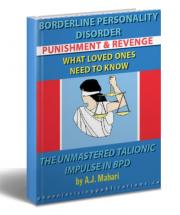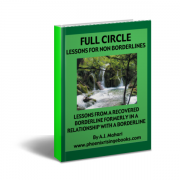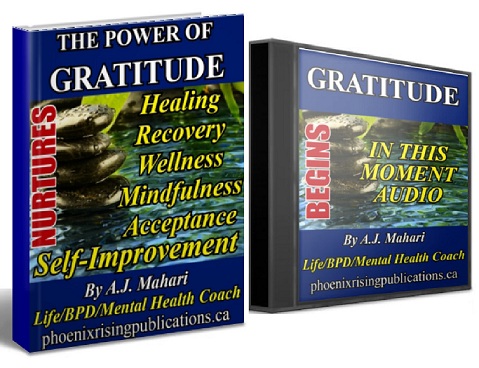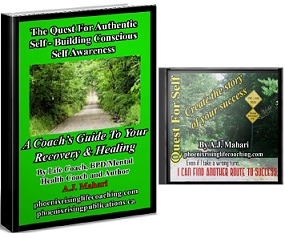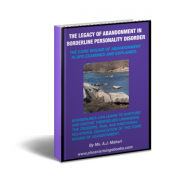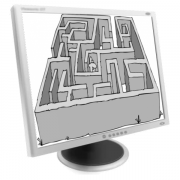![]()
Regrets: The Pain, the sadness and the reality
We all have some regrets. Borderlines, however, tend to pile up a rather large mountain of regrets and losses through patterned behaviour that they can seem determined and or destined to repeat. Patterned behaviour that in young early life helped you survive but that beyone that becomes maladaptive and effects those who are closest to you in ways that you may or may not yet realize. Losses of relationships, jobs, loss of self etc, are often not understood by people with BPD until and unless they get into treatment. Their constant search for a bond or attachment to the mother/father (or both parents) they were unable to securly attach to and bond with leaves the person with BPD experiencing friends, co-workers, partners, sibilings, anyone in their life really as a hoped for vehicle of having a "self" defined through other and of creating the original abandonment trauma subconsciously to try and resolve it but what actually happens is that those with BPD drive away people, family, relationship partners that really have loved and cared about them but who cannot continue to take the abuse and pain of being put in the "parent" role again often subconsciously by the person with BPD. When I work with BPD clients in Coaching this is something I can help them begin to gain awareness of and create healthy change around.
We all have some regrets. Borderlines, however, tend to pile up a rather large mountain of regrets and losses through patterned behaviour that they can seem determined and or destined to repeat. The choice is up to each borderline to end this cycle of reptitive negative connecting to have others meet their needs. Regrets don't have to be a way of life.
I would bet that no one gets through this life without some regrets. However, for those with Borderline Personality Disorder, (BPD) accumulating regrets can seem like a hobby of sorts. I know for me, after I recovered from BPD, I had to look back at a litany of regrets. Then comes the reality of the fact that regrets hurt and that they must be grieved so that we don't carry that sadness around with us.
For many their regrets go all the way back to early in childhood. How easy is it to keep trying to own the actions of others while ignoring (for years, at times) your own hurtful actions to others? Too easy all-too-often, unfortunately.
There seems to be something about the desparation, emotionally, that many borderlines feel and let dictate their lives. This desparation seems to almost fuel the impulses that contribute to the kinds of behaviour that just lead to one regret after another. It is important to look at the patterns of your behaviour. All behaviour means something and stems from somewhere.
It is natural to have regrets. The fact is though, by the time your pain or sadness is old enough to be a regret, or deep enough there is likely nothing that you can do to repair the loss. Here again is where grieving is the only way to move on.
Too many borderlines, each in his/her own way, ruminate about regrets. Looking back with "what-if's" and "if only's". The fact is that behaviour impacts people. If you have behaved in ways that have caused people to leave your life or tell you they can no longer deal with you, or in ways that have ended relationships, again, there really isn't any going back. Others have a right to heal too. Most often when they do, they do not want to go back. Trust is easily broken and it is much harder to repair. Often it cannot be repaired.
There is the opportunity, for you, in and with each and every regret to mourn the events that took place and to take personal responsibility for your part in what you lost. If you let it, loss, and the pain of regret can be great teachers and healers. If you feel troubled about past events that now cause you regret, rather than going over and over it, or aound in circles challenge yourself to address the causes, the reasons for your regret in a very honest manner. As you identify your part in things you can then become more aware of what you might be doing that others cannot tolerate in relationship with you.
We all make mistakes. We all have needs. Often we don't know how to meet those needs. Acknowledge your mistakes. Learn from your mistakes. Each time you come to the pain of regret let it be a reminder of all that you are working to change and why.
Active mourning of your losses will help you to move out of regret. Some regret is healthy. But to dwell on it or continually re-visit it (the same regret) is not healthy. Each loss that we have suffered needs to be grieved and let go so that we can move on. Sadly, when we have regrets, there is little that we can do to rectify the cause of those regrets.
Let your regrets teach you to adjust your behaviour to more socially-acceptable engaging relating as opposed to needy borderline relating, often co-dependent and enmeshed and very selfish. If you continue to relate in these very borderline, selfish ways, you will continue to add to the stockpile of all of your regrets.
Though the impulses may often be incredibly strong to try to go back and go back and fix and fix and promise and so forth, that is where the trap of regret will hold you stuck if you let it. Rather than going back over and over things that didn't work out, learn from them and stop repeating the same negative, self-sabotaging behaviour. Ask yourself, do you need more regret in your life? I'll bet the answer is no. And you certainly don't deserve it either.
Regret is about the past. Look to the here and now and to your future. Learn from yesterday but stop repeating the same patterns over and over. Each time you repeat a pattern and acquire yet another regret you have made a choice to not serve yourself or take care of yourself well. When will you stop re-victimizing yourself and admit that you've been hurt and hurt enough?
When will you begin to allow yourself to emotionally mature and to take the healthy risk of connecting with people in honest and meaningful ways instead of just to have your needs met by others. Needs that you need to learn to meet for yourself?
Working to recover from BPD can seem endless. It isn't endless though. It may seem that you are hitting brick walls, but you aren't. You are learning and growing and doing the best you can. Leave your regrets in the past where they belong and learn to live today.
© A.J. Mahari, November 4, 2001






